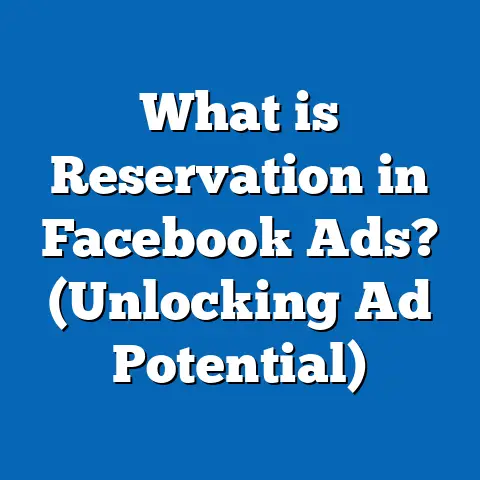What is MCA Facebook Ads? (Unlocking Advertising Potential)
Introduction: The Green Shift in Advertising and the Rise of MCA Facebook Ads
As consumers worldwide become increasingly aware of environmental issues, their purchasing decisions are shifting towards brands that demonstrate genuine commitment to sustainability.
Businesses embracing eco-friendly values find themselves better positioned to build trust and loyalty.
However, communicating these values effectively requires more than just good intentions—it demands precision in marketing.
Facebook remains one of the most powerful platforms for digital advertising, offering unparalleled reach and targeting options.
Yet, the sheer volume of advertisers and complex algorithms make it challenging to cut through the clutter.
Enter MCA Facebook Ads—a strategy built on certification, data expertise, and creative optimization aimed at unlocking Facebook’s advertising potential in a way that resonates deeply with modern consumers.
What is MCA Facebook Ads?
The Meaning Behind MCA
The acronym MCA stands for Marketing Certified Agency or Marketing Certified Advertiser, referring to individuals or agencies who have undergone specialized training and certification by Facebook (Meta) or recognized institutions.
These certifications ensure proficiency in Facebook’s advertising ecosystem, including:
- Understanding ad policies and compliance
- Mastering audience targeting tools
- Utilizing advanced metrics and analytics
- Applying best practices for creative design and campaign optimization
MCA Facebook Ads are campaigns built or optimized using these advanced techniques.
The certification is a mark of expertise that helps advertisers deliver campaigns efficiently with measurable results.
Core Characteristics of MCA Facebook Ads
- Data-Driven Targeting: Leveraging Facebook’s robust data points to reach niche audiences.
- Algorithm-Friendly Campaigns: Designing ads aligned with Facebook’s delivery system for maximum exposure.
- Creative Relevance: Tailoring ad creatives that speak directly to target audience interests and values.
- Performance Optimization: Continuous testing and refining based on performance metrics.
Why MCA Facebook Ads Matter
Facebook advertising is highly competitive.
According to Statista (2024), over 10 million advertisers use Facebook worldwide.
Without optimized strategies, ad spend can be wasted on irrelevant users or ineffective creatives.
MCA certification equips marketers to:
- Lower customer acquisition costs
- Increase return on ad spend (ROAS)
- Improve user engagement rates
- Comply with privacy regulations while capturing valuable insights
This expertise is especially important for brands emphasizing sustainability because such messaging requires authenticity and targeted delivery to impact consumer behavior.
The Foundations of MCA Facebook Ads
1. Certified Expertise: Training That Makes a Difference
MCA certification programs typically involve:
- Detailed coursework on Facebook’s ad platform architecture
- Hands-on experience with campaign setup and management
- Instruction on interpreting complex Facebook analytics dashboards
- Strategies for audience segmentation and creative testing
This training creates a systematic approach rather than guesswork, enabling advertisers to base decisions on proven tactics.
2. Audience Segmentation: The Science Behind Targeting
Facebook’s data allows segmentation based on:
- Demographics: age, gender, education, income level
- Interests: hobbies, pages liked, groups joined
- Behaviors: purchase behavior, device usage, travel habits
- Custom Audiences: previous customers or website visitors
- Lookalike Audiences: new users similar to existing customers
For eco-conscious brands, segmentation might include:
- Users following sustainability influencers
- Members of environmental non-profits
- Buyers of organic products or green technology
This precision increases the likelihood that ads reach receptive users.
3. Creative Optimization: Messaging That Converts
The creative aspect is crucial for brand storytelling. MCA Facebook Ads emphasize:
- Visuals that showcase eco-friendly features (e.g., recycled materials)
- Clear benefits highlighting environmental impact
- Calls to action encouraging sustainable choices
- Video content demonstrating product lifecycle or company values
Facebook reports that ads with video content see up to 10x higher engagement than static images alone.
Data and Statistics Supporting MCA Facebook Ads Effectiveness
Industry-Wide Metrics
- $137 billion: Facebook’s advertising revenue in 2023 (Meta Q4 Report).
- 2.9 billion users globally on Facebook as of 2024 (Statista).
- 25% higher conversion rates reported by advertisers using advanced targeting techniques (Facebook Business Insights).
- Ads focusing on sustainability have shown a 20% increase in purchase intent (Nielsen Global Sustainability Survey).
- Average CPC on Facebook varies by industry but can be reduced by up to 15% with certified optimization.
Deep Dive Case Study: GreenLeaf Apparel
Background: GreenLeaf Apparel sells eco-friendly clothing made from recycled fabrics.
Objective: Increase online sales while promoting environmental benefits.
Strategy:
- Partnered with an MCA-certified agency.
- Utilized detailed audience segmentation targeting users interested in sustainability.
- Created video ads highlighting recycled materials and ethical production.
- Used retargeting for website visitors who engaged but did not convert.
Results:
This case underscores how strategic targeting and creative can substantially improve performance.
Breaking Down Technical Concepts in MCA Facebook Ads
Facebook’s Ad Auction Explained Simply
When you run an ad on Facebook, it enters an auction where competing ads vie for space in users’ feeds.
The winner isn’t always the highest bidder but the ad that delivers the best value based on:
- Bid amount
- Estimated action rate (how likely users are to engage)
- Ad quality score (based on relevance and feedback)
MCA-certified advertisers understand how to optimize all three components by:
- Setting bids aligned with realistic budgets
- Improving ad quality through creative relevance
- Targeting audiences more likely to interact or convert
The Role of Facebook Pixel and Conversion API
The Facebook Pixel tracks user actions post-click to measure campaign effectiveness.
It collects data like page views, purchases, and sign-ups.
The newer Conversion API (CAPI) sends this data server-to-server, enhancing tracking accuracy especially amid browser restrictions and privacy policies.
MCA agencies ensure:
- Proper installation of Pixel on all relevant pages.
- Integration of CAPI for better data reliability.
- Use of this data for audience creation and campaign adjustments.
Understanding Campaign Objectives in MCA Facebook Ads
Facebook offers multiple campaign objectives such as:
- Awareness: Brand awareness or reach.
- Consideration: Traffic, engagement, app installs, video views.
- Conversion: Lead generation, catalog sales, store visits.
MCA-certified advertisers select objectives aligned with business goals and optimize accordingly for better results.
Practical Examples and Real-world Applications
Example 1: Local Organic Farm Grows Customer Base
Situation: A small organic farm wanted more local customers for its weekly vegetable delivery subscription.
MCA Approach:
- Created custom audience targeting local zip codes within 20 miles.
- Used video ads showing farm-to-table process emphasizing natural methods.
- Retargeted website visitors who browsed subscription plans but didn’t sign up.
Outcome:
Example 2: Sustainable Fashion Startup Expands Reach
Situation: Startup selling clothes made from recycled fabric sought young adult customers aged 18–30.
MCA Tactics:
- Built lookalike audience from previous purchasers.
- Ran Instagram story ads with swipe-up links.
- Highlighted zero-waste production via short documentary clips.
Results:
Comparing MCA Facebook Ads with Other Advertising Platforms
To understand the unique strengths of MCA Facebook Ads, here is a detailed comparison:
MCA Facebook Ads excel in emotional engagement and brand loyalty building—all vital for eco-friendly marketing.
Advanced Details: Leveraging AI and Automation in MCA Facebook Ads
Understanding AI-Powered Campaigns
Facebook’s AI tools like Advantage+ campaigns automatically optimize ad delivery by:
- Adjusting bids dynamically
- Allocating budget across best-performing ads
- Selecting optimal placements (feed, stories, reels)
MCA-certified marketers know when to trust automation and when manual oversight benefits performance.
Dynamic Budget Allocation Strategies
Instead of fixed budgets per ad set, advanced campaigns allocate funds based on real-time performance analytics:
- Test multiple audiences with small budgets initially.
- Scale budgets toward top-performing segments dynamically.
- Adjust bids based on time of day or device usage patterns.
This flexibility maximizes overall ROI.
Industry Trends Impacting MCA Facebook Ads (2024 Update)
Privacy Changes Shaping Data Strategies
With GDPR in Europe, CCPA in California, and Apple’s iOS privacy updates limiting tracking via Identifier for Advertisers (IDFA), advertisers face challenges in data collection.
MCA advertisers adapt by:
- Collecting more first-party data through lead forms and website interactions.
- Using Conversion API for server-side data sharing.
- Focusing on contextual targeting rather than solely behavioral data.
These changes encourage transparency and build consumer trust.
The Growing Demand for Authentic Sustainability Messaging
According to a 2024 Global Web Index report:
- Over 70% of consumers prefer brands that are transparent about sustainability efforts.
- About 50% have stopped buying from brands they perceive as greenwashing.
This trend forces marketers to ensure authenticity in messaging—something MCA-trained advertisers emphasize through clear storytelling backed by evidence like certifications or impact reports.
Practical Guide: How to Start Using MCA Facebook Ads
Step 1: Get Certified or Collaborate with an MCA Agency
If you’re new to certification:
- Enroll in Meta’s official Blueprint courses.
- Gain hands-on experience through practice campaigns.
Alternatively, collaborate with an agency holding MCA certification for expert support.
Step 2: Define Your Campaign Objectives Clearly
Are you aiming for:
- Brand awareness?
- Lead generation?
- Online sales?
Your objective drives ad format choice and optimization strategy.
Step 3: Set Up Your Tracking Infrastructure
Install the Facebook Pixel correctly:
- Track key events like Add to Cart, Purchase.
Integrate Conversion API if possible for enhanced data capture.
Step 4: Build Your Audience Segments Thoughtfully
Use combinations of:
- Custom Audiences (website visitors)
- Lookalike Audiences based on best customers
- Interest-based segments aligned with eco-conscious values
Test various segments for performance insights.
Step 5: Develop Creative That Resonates
Create videos or images that:
- Highlight your sustainable practices visually.
- Share customer stories or testimonials.
Use straightforward messaging avoiding jargon.
Step 6: Launch Campaigns & Monitor Performance Daily
Track metrics like:
- CPC (Cost Per Click)
- CTR (Click Through Rate)
- CPA (Cost Per Acquisition)
Adjust bids, budgets, or creatives based on data.
Common Challenges with MCA Facebook Ads and How to Overcome Them
Challenge 1: High Competition Driving Up Costs
Solution: Refine audience targeting to niche eco segments; use lookalikes; test placements beyond feeds such as stories or reels where costs may be lower.
Challenge 2: Ad Fatigue Leading to Declining Engagement
Solution: Rotate creatives regularly; use dynamic creative ads that automatically test variations; refresh messaging every few weeks.
Challenge 3: Attribution Complexity with Privacy Changes
Solution: Use multi-touch attribution models internally; rely more heavily on Conversion API; focus on long-term customer value rather than immediate conversions only.
Future Outlook for MCA Facebook Ads & Sustainable Marketing
The intersection of digital advertising expertise and sustainability will continue evolving rapidly. Expect:
- Greater integration of AI tools that balance automation with ethical ad delivery.
- Enhanced privacy-compliant data solutions improving targeting accuracy without compromising user trust.
- Increased consumer demand for transparency pushing brands to adopt verified sustainability claims in advertising.
- Expansion of immersive ad formats like augmented reality showcasing product impact visually.
Professionals skilled in MCA Facebook Ads who blend technical mastery with authentic storytelling will lead this transformation.
Final Takeaways & Actionable Next Steps
- Prioritize Certification: Gain official training or work with certified agencies to stay ahead.
- Use Data Wisely: Implement Pixel and CAPI correctly; develop detailed audience segments.
- Focus on Authentic Messaging: Ground all creative in real sustainability efforts backed by proof.
- Leverage AI Tools Judiciously: Combine automation with manual oversight for best results.
- Adapt to Privacy Rules: Stay compliant while maximizing first-party data collection.
- Measure Continuously: Use metrics to refine campaigns iteratively—aim for long-term growth not just quick wins.
- Stay Educated: Follow Meta’s updates and industry trends regularly to keep strategies fresh.
By applying these principles consistently, marketers can unlock the true potential of MCA Facebook Ads—boosting business growth while championing a greener future.




